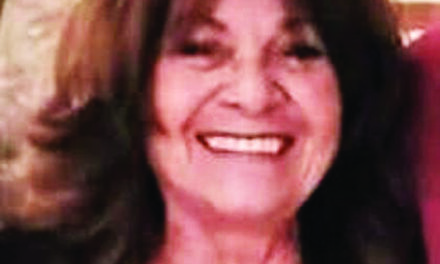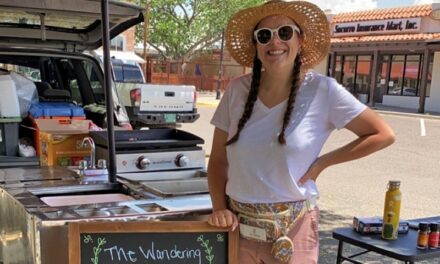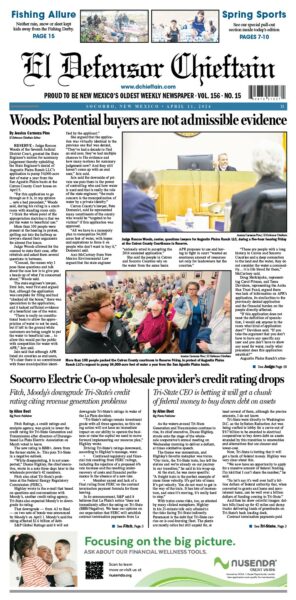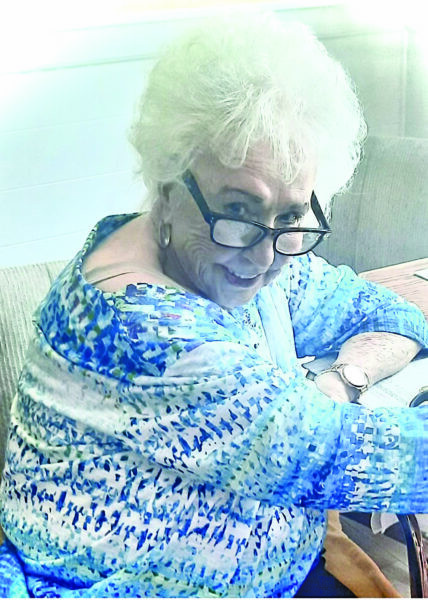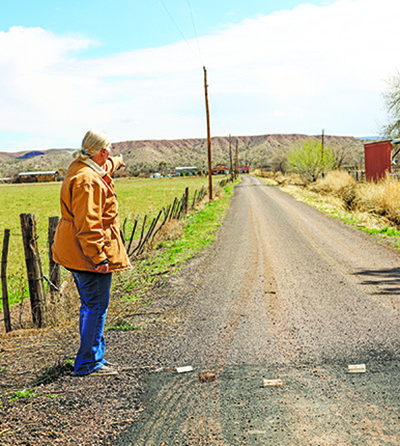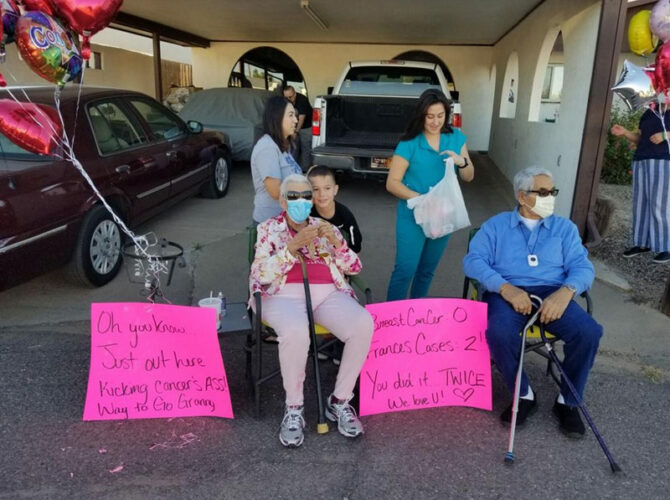
Frances Cases, in the pink jacket, with her husband, Paul, sitting next to her, celebrates defeating breast cancer for the second time. She went through her treatments in May and June and is currently on medicine for her remission. Photos courtesy of Tanya Pike
Frances Cases has done a lot for the City of Socorro during her time on city council and as a municipal judge. She has also been in the San Miguel Church choir for most of her life and gives back through the church. Cases has had many struggles, as she lost a 15-year-old daughter and is battling breast cancer for the second time.
What first got you interested in law and the government?
Actually, it wasn’t so much that I was interested in law as I am interested in public service to the community. I’ve been in politics since I was in my 30’s. I ran for city council and I was on the council for eight years, two terms and mayor pro tem for a little while. After that, I took some time off due to the death of my 15-year-old daughter and then I went back and I ran for county commissioner and I lost by one vote.
After that, it was Mayor Bhasker that wanted to appoint me for the municipal judge and I thought about it, because I knew it was about enforcing the law, and so I agreed to go ahead and be appointed by him. One of the requirements was that I was going to run for office because the vacancy was due to the honorable Mike Trujillo that passed away in December of 1994. In 1995 in January was when (Mayor Bhasker) appointed me.
After that, part of the requirement of a municipal judge is to attend conferences and it’s usually for a week to bring you up to date on the new laws and to also train you. I didn’t have a degree — you don’t have to have a degree when you are a municipal judge, it’s not required. The requirement is to be registered in the City of Socorro and be over 18. I was in my early 40s and I had those requirements… before I got on the bench and I had to get on the bench in two weeks once I was sworn in… I asked the municipal league in Santa Fe, they are the ones who provide education to us and answer any questions, I asked them for a mentor. I asked them for a woman and a man. I wanted a woman and then I wanted a man and one of them had to have a degree. I ended up with a judge from Las Cruces and then I had a teacher who was the municipal judge in Mesa. I took off two weeks and I went to Las Cruces and I went to the judge that was in Mesa and I observed her court and I asked her questions after and then I also went to the other judge in Las Cruces to observe his court.
I was the employee for Socorro Mental Health and I started the Teen Court in Socorro. I went for the training and I think it was through a grant through Socorro Mental Health that I went for the training and when I came back, I went ahead and put my training to work. I had to hire another person, but we had something very similar to a general court of misdemeanors with the teenagers. It was a very nice program because teenagers were judging themselves and it was very interesting and at the same time we had to make sure that the teenagers understood that it was not something you had to compete against or try to judge impartially. You had to be careful and make sure that somebody was not getting along with some of the people in the program. We had a person that was a defense attorney and the other attorney for prosecution and we had a jury with some teenagers. It was all volunteer. We had sentences. That alone interested me quite a bit so when I was offered the municipal judge, I more or less was ready for a step up from the teen court. It was quite a step up.
I’ve been there for over 25 years. So far, I haven’t had to be before the standards commission. It’s called the Judicials Standards. If someone complains about how I was running the court or the judgements when I was judicading cases then you had to go before the Judicials Standards. I’m very happy to say that so far I haven’t been reported by anyone and I’m proud of that. I’m very proud of the fact that I took my job seriously and I made sure that because I was a public servant that I would bring right to that office and never try to disrespect it in any way by my own personality coming out in it. I tried to be very fair when judicading the cases. I’m proud to say that I was very careful to not smear the office.
Why did you want to work in public service?
I’ve been in public service and I’ve been the type of person who has always been willing to be in public service so that I could be a voice for the people. Even in school, I was always elected as a leader and as a spokesperson. I became more interested as I became an adult and continued to live in this city. I figured that it was an opportunity for me to serve the people.
First woman on city council?
Yes, I was the first woman on city council and I was the first woman as a municipal judge.
How big of an honor is that?
It’s very much an honor. It’s an honor that I really truly respect. I didn’t realize that I was until somebody said it to me. I really wasn’t looking to be the first woman because at that time, they didn’t have big to do with women being in office because at that time, there weren’t many women in office. When I became the first woman and realized that, I also wanted to when I’m in public to let young women know that if I can do it, anyone can do it. That is what I mean by being the voice of the people. I am well known in Socorro. I was well known as a nice lady, but when I became a judge I realized that I had to be very careful not to be biased — that I had to be fair and still do the job that I have to do that the law requires me to do. I was very happy that when I took on that job that I was representing a lot of women also. To date, that is a very big thing in politics. A lot of women are running for office and winning. I’m very proud that I might have been one of the women that started and encouraged other women to run.
Other interests?
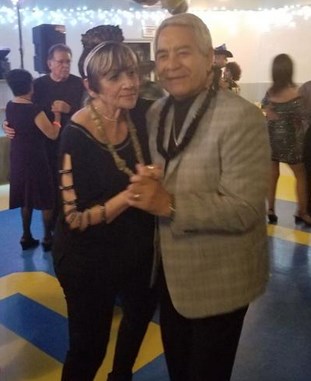
Frances Cases and her husband, Paul, dance together.
I love music. I’ve always loved music since I was a very young child. My mother taught me how to sing when I was 3- or 4-years-old. She put me in a bunch of shows so that I could sing by myself with music. I learned how to sing with my mother and she taught me not only melody, but taught me harmony. She was a wonderful, wonderful teacher. She was not a teacher of music, she just liked it herself and taught me. I went on to sing in high school and when I graduated out of high school and married and started a family, I would sing with a choir in the San Miguel Church. I’ve always sang with a choir. I’ve sung with all kinds of choirs. I sang when I was a young girl in Latin when Latin was part of the mass. I’ve sung with a Spanish choir and now I’m singing with an English choir. I had been selected to sing at the Spanish Heritage in Santa Fe and that was in the 1970’s. I sang with Toby Jaramillo and his wife and Johnny Lucero… I’ve sung for the ArchBishop out of Santa Fe. I’m a soloist. I’ve sung for weddings and funerals. I’ve sung in a band. Music is my life and right now I’ve been singing in the choir for many years. I really miss that now with the pandemic. I’m looking forward to going back to the choir when this is over because I miss that and my friends.
What all have you done for the church community?
We sing for weddings and for funerals. We sing at special events. The church has a lot of special events where sometimes you have to go to other churches and sing. We’ve done all of that and it takes a lot of practice. We do it on a volunteer basis. If you are in the choir, you are one of the ministries of the church… we try to do as much as we can to serve the church community. I feel really close, right now, to the church. Right now, I’m very appreciative and grateful. I have a lot of faith and I’ve been in my church for many years, never have wanted to leave it.
Recently, I got diagnosed with cancer. As a matter of fact, I’m still getting my treatments now and they are called the maintenance treatments. There is still some biotherapy which is part of my treatments. It’s like a chemo. I’ve gone through the worst which was between May and June. I went through the worst which was when I lost my hair. I told my granddaughter to shave it off because I didn’t want to start losing my hair in the shower or by pulling my hair. I used to see movies like that and I thought, ‘if that ever happens to me, I want it shaved off. I don’t want to go through all that.’ My granddaughter, who not only took care of me, but she is a nurse. Her name is Tara Hall and she is wonderful. She helped me through everything. I went through a lot of darkness. When I went through the worst, I looked like a zombie. I had some hard times because I lost a lot of weight because of the chemo and I lost a lot of weight and I really had a hard time. I stopped eating and I stopped drinking. With the grace of God, I was able to recover and with proper sleep, care and a lot of prayers from a lot of the people who supported me, this is not my first rodeo.
This is the second time I’ve been diagnosed with cancer. The first time was in 1994 so I recovered from that pretty much right away in a year or so. This one was a lot more intense. Right now, I am praising God because I believe that is what lifted me up and my husband and all of the people that prayed for me.
My daughter Tanya Pyke, she is also one of my caretakers. She moved a trailer here and lived in the trailer because she couldn’t come in all the time with the pandemic. She made my meals and she made sure that I was taking my medication and everything that a caretaker does. Between her and my husband and my daughter Tanya’s boyfriend and my one other granddaughter was Ashley Pyke. They are the ones that brought me the groceries. My sons Darryl and Don Cases, they brought me groceries and they had to spray them to disinfect them and went through the whole thing. They really wanted to make sure that I was protected because I had so many underlying issues. I’m also a diabetic and Dr. Bhasker was taking care of me to make sure my sugars were being managed. The doctors in Albuquerque, my oncologist, my surgeon, my radiologist, were all part of the team that I had that were so wonderful. Now, I have to take one medication, this biotherapy by infusion, and I have to take some medication for five years and I hope I will be cancer free by that time.
What was it like trying to get your treatments during the pandemic?
I have only been out since the pandemic started, to the cancer center and maybe to my daughter’s because I had to have 15, I call them zaps, 15 rounds of radiation so I stayed at my daughter’s in Albuquerque. With the help of my daughter Tanya, she drove me over there and drove me back and made sure I had my mask on and made sure that when I got my treatments because nobody could come in with me, you had to go in by yourself and it was kind of scary. The nurses are so nice and so professional and so compassionate so they made me feel very comfortable. I went through that routine for several months until I got real sick and they had to stop the chemo. All the time that I was doing all that, I was working. I was working virtually. If I had any calls or cases, I took care of them. During the time I was very sick, we asked them if they could hold off until I got better, if it was the type of case that could, they agreed. I still am right now taking cases virtually. If I have a trial, it’s by audio. All of that has been part of my life with this pandemic. I have not been out, even to Walmart. I didn’t even know they had fixed the streets on the main highway until we went riding one day just for a while to get some fresh air — my husband and I do that once in a while. Thank God for my husband, Paul, he’s been there to help me.
My neighbors have been wonderful and have filled me with kindness. They bring me food and all kinds of things to snack on and they wear their masks. I have a little table where they leave the food and knock on the door or ring the bell. I have two very good friends that provide me with food once in a while. I’ve had a lot of friends who have brought me food, called me, wished me well on the phone or on Facebook and with cards. I’ve been very blessed that I’ve had a lot of support from Socorro.
If there was one thing you could change about Socorro, what would it be and why?
One of the changes that I have made though my job as a municipal judge is to try not to send everyone to jail. Why? The more I talk to people and the more I hear what is going on in their life, there are a lot of people that have a serious drug problem. I don’t believe that there is any rehabilitation by sending someone to jail because they don’t pay their fines. Especially the type of judge that I am, I am the lowest of all courts. I take care of traffic violations, animal control, zone ordinances. I have a few alcohol and drug related citations that are in the ordnance, but they are all misdemeanors.
These people, I call them frequent flyers, over and over for the same thing. I ask them what is going on in their life and they start talking to me and before I know it, they reveal that they have been on drugs or they are on drugs. The type of ordinances that they break, except for the ones that are alcohol related or drug related, are all traffic or are not the ones for animal control. They are breaking the laws because they are on drugs. The punishment has to fit the crime. Legally, I can’t just send people to rehab or to get some counseling. What I did is to do it legally, I set up some forms and asked them for their permission if they would agree to send them, I give them choices, to one of two agencies here to get the help that they need. I would consider removing the fines if they complete it. Most of the time they did. In the beginning, it was very slow to get off the ground. We have had a reduction in the recidivism for young people. After they are given their assessment, they are given a plan to help them through the recovery. If they go to rehab, they have to go through rehab through another court at a different time because they have jurisdiction to send them through the county and I do not. I went and I got it approved and I think it is working very well and I hope that if and when I retire that whoever takes over after me continues that program. With all the drug courts that are in Socorro, I think they are finally doing the same thing.





